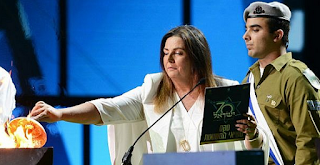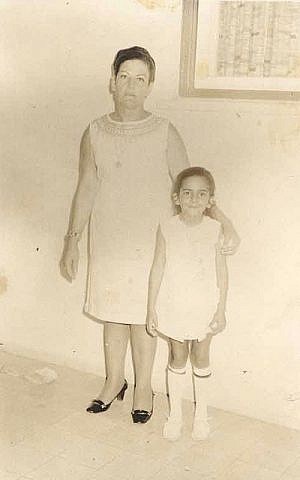
Her mother was an illiterate cleaning lady from Morocco, but Professor Marcelle Machluf is a leading Israeli biochemist who is pursuing a revolutionary new approach to fighting cancer. Profile in The Times of Israel: (with thanks: Michal)
Machluf immigrated to Israel from Morocco at the age of one with her mother and grandmother. The three lived in Ashdod, in a 48-square meter apartment (517 sq feet); none initially spoke the language. Her mother, a seamstress, earned a living by cleaning offices and schools and Machluf used to go with her to help after school. After her mother was injured, an 11-year-old Machluf did most of the cleaning work, together with her mother’s friend.
Marcelle Machluf was chosen to light a torch at Israel’s independence celebrations
Her mother, said Machluf, hadn’t gone to school and couldn’t read or write, but did everything for her family, from painting the walls of their one-and-a-half-bedroom apartment to bringing in an income. “She cooked and she took care of me,” she said. “She always told me: without education you are nothing. You need to pursue an education.”

So Machluf invested a lot of time in her studies, but she was also lucky, she said, because she really loved learning. “You need to have the will. Because if you don’t have the will, even if you have all the means, you can’t force someone to do what they don’t want to do. I had the will; I had the motivation.”
Machluf dreamed of being a doctor, but didn’t get accepted to medical school in Israel. So, she opted for biology studies at The Hebrew University of Jerusalem and soon fell in love with the field and the research lab. She went on to earn a master’s degree and doctorate in biochemical engineering at Ben-Gurion University of the Negev and a post-doctorate at Harvard.
Being a female researcher was not easy, she said, and being of Mizrahi — or Eastern — origin, when most of academia was dominated by men of Ashkenazi descent, was even more challenging, she said. Ashkenazi Jews have roots in Germany, France and Eastern Europe; Mizrahi Jews come from the Middle East of North Africa.
Climbing up the career ladder is difficult “because a woman has always the conflicts between family and career,” she said. “And always, when someone gives up on their career, it is usually the women to support their husbands.”
Her husband, she said, a driving instructor, was happy to take the backseat and let her forge ahead in her career.
Though Machluf is confident in her nano-ghost theory, she admits it faces a lot of skepticism in the academic, corporate and research world.
Hers is an”outside-the-box approach,” she said, “not the typical system that everyone is studying” to combat cancers.
Current cancer treatments involve radiotherapy and chemotherapy, usually conveyed via intravenous infusion. The cancer drugs that are available can be extremely effective, but they also cause damage to healthy tissues. Targeted drug delivery has thus become a major thrust of recent research, but existing solutions are limited to certain kinds of cancer at particular stages. Hence a universal carrier for targeted drugs, like that proposed by Machluf, would be a major breakthrough in cancer research.
Many drug delivery researchers use polymers or other substances to carry their medications. These do not necessarily target just the cancer, Machluf said.
Her product, she said, would be a new player in the market with the potential to take “a big chunk” of the existing research market.

Leave a Reply